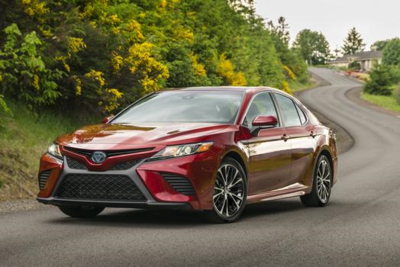2018 Toyota Camry SE Hybrid Review By Steve Purdy +VIDEO
 |
2018 TOYOTA CAMRY HYBRID SE
Review
By Steve Purdy
The Auto Channel
Michigan Bureau
- In the real world Toyota Hybrid batteries typically last well over 200,000 miles
- Toyota Camry Interior details have been nicely updated
- Good quality materials and first rate fit and finish
- You’ll not want to be pushing Toyota Camry Hybrid hard through twisty roads. Soft steering...
- Toyota Camry Hybrid warranty covers the whole car for 3 years or 36,000 miles and the powertrain for 5 years or 60,000 miles. Hybrid components are covered for 8 years or 100,000 miles.
- My Son-in-law, Mike, is an ideal Camry customer, and I’ve just recommended the new Camry Hybrid
When I talk to potential buyers of hybrid or electric cars the question most asked is: what if the batteries have to be replaced? Wouldn’t that be prohibitively expensive?
Well, yes. It would be expensive, probably around five grand, if you ever had to do it. But the Toyota engineers tell me, and I’ve seen no evidence to the contrary, that these battery packs essentially will last the life of the car. And, by the way, the batteries are warranted for either 8 or 10 years, 100,000 to 150,000 miles, depending on the state you live in. In the real world they typically last well over 200,000 miles. Even after that they can still be used, though at the lesser efficiency, perhaps in a battery farm.
So, having dealt with that concern, let’s move on to review the Camry Hybrid itself, shall we?
Camry has led the nation in sedan sales most of the last 20 years or maybe more, for good reasons – quality, efficiency, durability and inoffensive design. It tries to be all things to all mid-size sedan buyers and does a fine job of that. Over the past couple of generations of this long-running model, Camry risked some of that formula by presenting bolder and bolder styling, particularly in exterior design but inside as well.
Like both Toyota and Lexus sedans the dominant exterior design element is the front fascia dominated by a big, bold, brash grille surrounded by intensely sculpted cheek vents. High shoulders and distinctive character lines keep your eye moving around to the less-than-distinctive rear that looks just like larger sibling Avalon.
Interior details have been nicely updated over recent years with swooping horizontal lines across the right side of the dash, a vertical center stack with great functionality and a driver’s environment that will offer no thrills but give you all the information and functionality you’ll need. Good quality materials and first rate fit and finish are accentuated by contrasting stitching on the seat trim, in this case fabric seats that look nearly as good as the leather ones.
One of the complaints of earlier Camry Hybrids was the lack of trunk space because of the batteries, but they have done a much better job of using every cubic inch to now have a decent size trunk with 13 cubic-feet of cargo space.
Toyota’s Synergy Drive led the move to mainstream automotive hybrid power sources beginning in the 1990s. Now that most manufacturers have similar systems Toyota no longer leads the pack but remains competitive with this 2.5-liter Atkinson-cycle engine augmented by a powerful motor/generator making a combined 200 horsepower and 199 pound-feet of torque. Getting power to the road is an inoffensive and efficient continuously variable transmission. The 1.6 kWh nickel-metal-hydride battery pack holds onto enough power to run the car exclusively in short bursts saving gasoline particularly in stop-and-go city driving. The Synergy system seamlessly integrates power sources for maximum efficiency. The EPA says we can expect around 40 mpg in the city and 37 on the highway while offering a 0-to-60 time of a decent 7 seconds. In real world, many drivers will do better, depending on conditions.
Conventional suspension design and tuning make for adequate handling but you’ll find it far from class-leading. Camry will exhibit more sway and squeal on your cloverleaf freeway ramp than most. While acceleration is reasonably brisk, you’ll not want to be pushing it hard through twisty roads. Soft steering feel will not impress car enthusiasts but will not be off-putting to anyone else.
Toyota just fully updated the Camry lineup including the hybrid for 2018. These new ones range in starting price from $27,800 for the LE to $32,250 for the high-end XLE. You’ll find plenty of competition out there from most of the mainstream competitors. So . . . better shop around. You’ll still find the 2017s on dealer lots and they are probably being discounted now.
Toyota’s warranty covers the whole car for 3 years or 36,000 miles and the powertrain for 5 years or 60,000 miles. Hybrid components are covered for 8 years or 100,000 miles.
Our son-in-law, Mike, is an ideal Camry customer, and I’ve just recommended the new Camry Hybrid to him. He is approaching 100,000 miles on his 2010 version of the same car and, though it’s getting a bit natty, he still likes it. He’s not particularly fond of cars generally but pays attention mostly to cost, efficiency and his carbon footprint. He lives in the Chicago suburbs and has a relatively short freeway commute to work, though when he bought the car they lived in the city and he had a one-hour-plus slow slog to his office on the outer ring. And, the best part is, his company offers a subsidy for hybrid and electric car purchases.
Just about all the major automakers have announced, and already embarked upon, programs to drastically increase hybrid, plug-in and full electric models. This Camry is perhaps the most proven in the mid-size class.
© Steve Purdy, Shunpiker Productions, All Rights Reserved
MORE TOYOTA INFORMATION
- Toyota Buyers Guide | Specs, Prices, Expert Reviews and Comparisons 2018-1997
- Find Your Perfect New Car Match
- Toyota Reviews From The Auto Channel (1993-Present)
- The Auto Channel's Toyota Brand Archives; News, Press Releases, Reviews, Specifications, Prices, Video, Images (103,001 Annotations)



